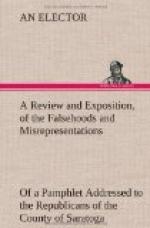To accept, as an explanation of the war the statement that Germany has a highly trained army she has not used for nearly half a century and that her people are so obsessed with admiration for it that they longed to test it on their neighbours, is to accept as an explanation a stultifying contradiction. It is of course much easier to put the blame on the Kaiser. This line of thought is highly popular: it accords, too, with a fine vulgar instinct.
The German people can be spared the odium of responsibility for a war they clearly did nothing to provoke, by representing them as the victims of an autocracy, cased in mail and beyond their control. We thus arrive at “the real crime against Germany,” which explains everything but the thing it set out to explain. It leaves unexplained the real crime against Europe.
To explain the causes of the war we must find the causes of the alliances of England, France and Russia against Germany.
For the cause of the war is that alliance—that and nothing else. The defence of the Entente Cordiale is that it is an innocent pact of friendship, designed only to meet the threat of the Triple Alliance. But the answer to that is that whereas the Triple Alliance was formed thirty years ago, it has never declared war on anyone, while the Triple Entente before it is eight years old has involved Europe, America, Africa, and Asia in a world conflict. We must find the motive for England allying herself with France and Russia in an admittedly anti-German “understanding” if we would understand the causes of the present war and why it is that many besides Bernard Shaw hold that “after having done all in our power to render war inevitable” it was idle for the British Government to assume a death-bed solicitude for peace, having already dug its grave and cast aside the shovel for the gun. When that motive is apparent we shall realise who it was preferred war to peace and how impossible it is to hope for any certain peace ensuing from the victory of those who ensured an appeal to arms.
The Entente Cordiale, to begin with, is unnatural. There is nothing in common between the parties to it, save antagonism to someone else. It is wrongly named. It is founded not on predilections but on prejudices—not on affection but on animosity. To put it crudely it is a bond of hate not of love. None of the parties to it like or admire each other, or have consistent aims, save one.
That satisfied, they will surely fall out among themselves, and the greater the plunder derived from their victory the more certain their ensuing quarrel.
Great Britain, in her dealings with most white people (not with all) is a democracy.
Russia in her dealings with all, is an autocracy.




